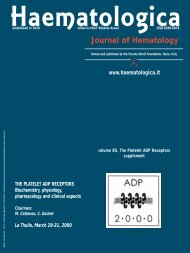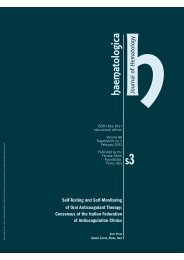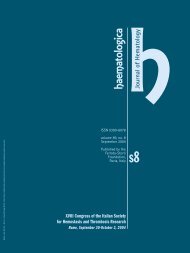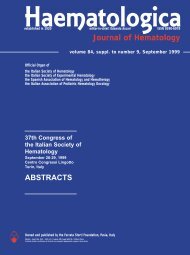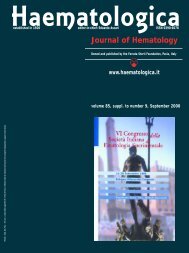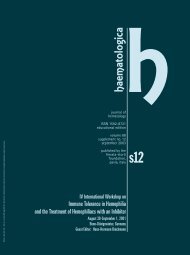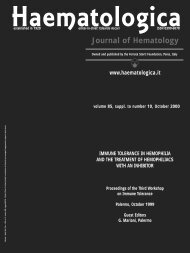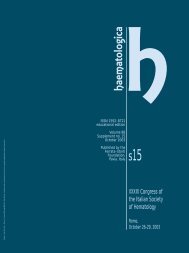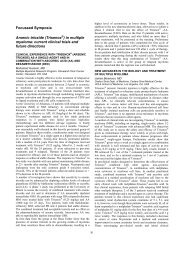Journal of Hematology - Supplements - Haematologica
Journal of Hematology - Supplements - Haematologica
Journal of Hematology - Supplements - Haematologica
Create successful ePaper yourself
Turn your PDF publications into a flip-book with our unique Google optimized e-Paper software.
haematologica 2000; 85(supplement to n. 11):89-92<br />
original paper<br />
Autologous bone marrow transplantation versus alternative drugs<br />
in pediatric rheumatic diseases<br />
LOREDANA LEPORE, VALENTINA KIREN<br />
Clinica Pediatrica Università di Trieste, Ospedale Infantile Burlo Gar<strong>of</strong>olo di Trieste, Italy<br />
ABSTRACT<br />
A minority <strong>of</strong> children suffering from severe<br />
rheumatic diseases are unresponsive to conventional<br />
treatments. These patients can now be managed<br />
with a variety <strong>of</strong> immunosuppressive therapies.<br />
Methotrexate is considered the first choice diseasemodifying<br />
agent for adult and juvenile rheumatoid<br />
arthritis. In patients unresponsive to low doses <strong>of</strong><br />
methotrexate, medium or high-doses can be useful.<br />
Instead <strong>of</strong> methotrexate, a recently develped immunosuppressive<br />
drug, mycophenolate-m<strong>of</strong>etil, which<br />
inhibits T- and B-lymphocyte proliferation, can be<br />
used. Another possibility for refractory rheumatic<br />
diseases, with no increase in toxicity, is combination<br />
therapy, for example methotrexate plus cyclosporine,<br />
or methotrexate plus salazopyrine or intravenous<br />
pulses <strong>of</strong> cyclophosphamide and methylprednisone.<br />
More recently two distinct inhibitors <strong>of</strong><br />
tumor necrosis factor (etanercept and infliximab<br />
have been used successfully for intractable<br />
rheumatic diseases (juvenile idiopathic arthritis, psoriatic<br />
arthritis, spondyloarthropathies) but the followup<br />
is still too short to establish their long-term effectiveness.<br />
If all these treatments are unsuccessful, an<br />
autologous bone marrow transplantation can be proposed<br />
to selected patients. Interesting results have<br />
been obtained in pediatric rheumatic diseases such<br />
as juvenile idiopathic arthritis, systemic lupus erythematosus<br />
and systemic sclerosis. Further studies<br />
are required to assess the best procedures able to<br />
induce remission with a minimal risk <strong>of</strong> fatal events.<br />
©2000, Ferrata Storti Foundation<br />
Key words: ABMT, pediatric rheumatic disease<br />
Despite the overall prognosis being good<br />
for most patients suffering from pediatric<br />
rheumatic diseases, in a minority <strong>of</strong><br />
children the disease is intractable, being unresponsive<br />
to non-steroidal anti-inflammatory<br />
drugs even in combination with steroids and/or<br />
immunosuppressive therapy.<br />
Among the immunosuppressive drugs, methotrexate<br />
is increasingly being used not only in juvenile<br />
idiopathic arthritis (JIA) but also in psoriat-<br />
Correspondence: Loredana Lepore, Clinica Pediatrica Università di Trieste,<br />
Ospedale Infantile Burlo Gar<strong>of</strong>olo di Trieste, Italy<br />
ic arthritis, 1 spondyloarthropathies, 2,3 systemic<br />
lupus erythematosus, 4 Crohn’s disease 5 and also<br />
in chronic uveitis, 6 because <strong>of</strong> the quick reaction<br />
time to this drug and its superior effectiveness<br />
and tolerability. For these reasons, it is nowadays<br />
considered the first choice disease-modifying<br />
agent for adult and juvenile rheumatoid<br />
arthritis.<br />
A collaborative study <strong>of</strong> the Italian Pediatric<br />
Rheumatology Group 7 demonstrated that at the<br />
conventional dose regimen methotrexate is<br />
effective in about 60% <strong>of</strong> patients suffering from<br />
JIA and is equally safe when administered orally<br />
or by intramuscular injections.<br />
Some patients fail to achieve remission with<br />
the standard dosage (10 mg/m 2 /weekly) but<br />
respond to higher dosages (from 15 to 20<br />
mg/m 2 /weekly). We do not know how many<br />
patients could benefit from medium and high<br />
doses (a Pediatric Rheumatology International Trials<br />
Organization study about this is ongoing), however<br />
this treatment represents another chance<br />
for such patients.<br />
The clinical effectiveness <strong>of</strong> methotrexate in<br />
the treatment <strong>of</strong> resistant juvenile idiopathic<br />
arthritis was established in 1992 8 following a<br />
controlled short-term study.<br />
More recently Ravelli et al. 9 have shown that<br />
methotrexate really has a “disease-modifying”<br />
potential in JIA, given its capacity to slow down<br />
the radiologic progression <strong>of</strong> the disease.<br />
The drug is very safe and well tolerated and its<br />
long-term use does not appear to be associated<br />
with development <strong>of</strong> significant liver fibrosis<br />
even in patients who receive a cumulative dose<br />
equal to 3 g/m 2 <strong>of</strong> body surface area. 10,11<br />
Even though methotrexate represents an<br />
important step forward in the treatment <strong>of</strong><br />
infantile rheumatic diseases, about 40% <strong>of</strong><br />
treated patients do not respond in a satisfactory<br />
way and require other immmunosuppressive<br />
drugs.<br />
Although there is little experience in the field <strong>of</strong><br />
pediatric rheumatology, 12 another immunosuppressive<br />
drug that could be used when<br />
methotrexate fails, is mycophenolate m<strong>of</strong>etil, a<br />
haematologica vol. 85(supplement to n. 11):November 2000



